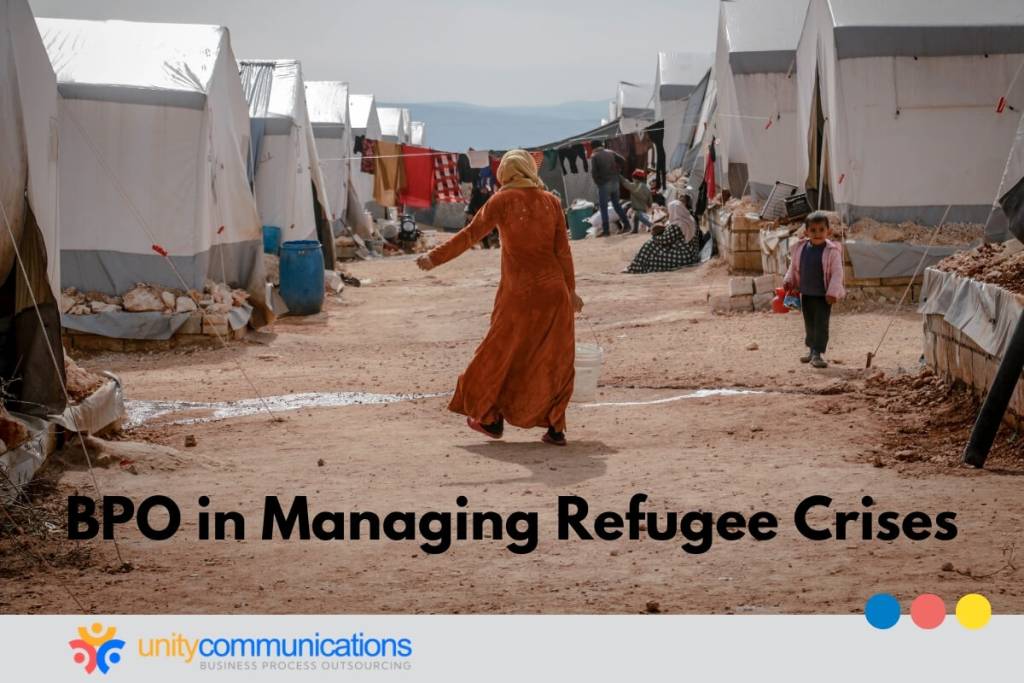IN THIS ARTICLE
Table of Contents
Refugee crises present significant challenges for humanitarian organizations. The influx of displaced individuals often overwhelms existing systems, leading to logistical bottlenecks, communication breakdowns, and resource shortages.
Business process outsourcing (BPO) is a strategic solution for addressing these concerns and improving the efficacy of humanitarian response efforts.
Keep reading to learn how BPO can assist organizations in effectively managing refugee crises. This article explores the benefits of and strategies for outsourcing.
Refugee crisis management and outsourcing

Refugee crises arise when a large number of people flee their homes due to conflict, natural disasters, or persecution. They often lead to humanitarian emergencies, with millions displaced and needing urgent assistance.
As of May 2024, the number of people displaced forcibly due to conflict, violence, persecution, or human rights violations has already reached over 120 million. This figure is nearly equal to Japan’s population of 122 million, the twelfth largest in the world.
The crises’ scale and complexity can overwhelm humanitarian organizations, complicating aid’s timely delivery and efficacy. This is why many agencies opt to partner with a BPO company. What is BPO’s role in managing refugee crises?
BPO, a practice of outsourcing non-core business functions to third-party providers, offers humanitarian organizations a flexible and scalable approach to refugee crisis management. BPO firms leverage specialized expertise and advanced technologies to streamline operations, improve efficiency, and enhance decision-making.
Functions to outsource in refugee crisis management
BPO firms provide comprehensive support for administrative functions and other critical tasks in managing refugee crises. Below are some processes humanitarian organizations can outsource to enhance refugee crisis response, improve the lives of refugees, and build more resilient communities:
Data management and analytics
Data is the lifeblood of an effective humanitarian response. BPO providers can help collect, clean, and analyze large datasets to inform decision-making. They leverage advanced analytics tools to identify trends, predict needs, and optimize resource allocation.
- Data collection and consolidation: BPO professionals streamline data collection from diverse sources, including field reports, surveys, and biometric information. This centralized data repository enables efficient analysis and informed decision-making.
- Data cleaning and validation: BPO firms employ advanced data cleaning techniques to ensure data accuracy and consistency for effective response efforts.
- Data analysis and insights: BPO in data analytics identifies patterns, trends, and critical insights to help humanitarian organizations allocate resources, prioritize needs, and anticipate challenges.
Logistics and supply chain management
Supply chain and logistics efficiency ensures aid reaches those in need. BPO providers can streamline relevant processes, such as sourcing supplies, tracking inventory levels, and coordinating aid delivery to refugee camps.
- Procurement and sourcing: BPO firms optimize procurement processes to ensure timely delivery of essential supplies, such as food, medicine, and shelter materials. They leverage their global network and expertise to source supplies at competitive prices and navigate complex supply chains.
- Inventory management: BPO teams implement robust inventory management systems to track stock levels, optimize stock rotation, and minimize waste so that essential supplies are always available.
- Transportation and distribution: BPO in logistics and transportation coordinates efficient strategies for supplies to reach refugee camps and distribution centers. By optimizing routes and schedules, they can reduce transportation costs and guarantee timely delivery.
Human resources and payroll
Managing a large, diverse workforce can be challenging. BPO providers handle recruitment, onboarding, payroll, and benefits administration tasks, freeing human resources teams to focus on strategic initiatives and employee welfare.
- Recruitment and onboarding: BPO teams streamline the recruitment and onboarding processes for field staff and volunteers to hire qualified personnel efficiently.
- Payroll and benefits administration: BPO providers manage payroll, taxes, and benefits for a diverse workforce, ensuring compliance with local regulations and minimizing administrative burdens.
- Performance management and training: BPO firms implement performance management systems and provide ongoing training and development opportunities to staff and volunteers, enhancing their skills and capabilities.
Financial management and accounting
Maintaining humanitarian efforts requires effective financial management. Organizations can seek BPO expertise for grant management, financial reporting, accounts payable, and accounts receivable to ensure that money is used properly and efficiently.
- Accounts payable and receivable: BPO teams efficiently process invoices, payments, and receipts for timely payment of suppliers and accurate financial records.
- Financial reporting and analysis: BPO firms generate accurate financial reports and conduct economic analysis, providing insights into the organization’s financial health and informing decision-making.
- Grant management and compliance: BPO providers adhere to grant guidelines and regulations, minimize the risk of audit findings, and effectively utilize funds.
Customer service and call center operations
Effective communication is vital in humanitarian response. BPO teams manage help desks and call centers to provide information, answer questions, and address concerns. This is especially important for refugees and asylum seekers who might need assistance with various issues, such as healthcare, education, or legal services.
- Help desk and information services: BPO agents provide information and assistance to refugees, staff, and volunteers through dedicated help desks and call centers.
- Complaint management and resolution: BPO firms efficiently handle complaints and inquiries, ensuring timely resolution and improving customer satisfaction.
- Multilingual support and translation services: BPO teams offer multilingual support and translation services, facilitating communication and understanding between diverse populations.
Technology-enabled refugee management
Technology can enhance refugee management’s efficiency and effectiveness. Humanitarian organizations can collaborate with BPO providers to integrate advanced solutions into data collection, analysis, decision-making, and other key processes.
- Biometric identification: BPO teams implement biometric identification systems, such as fingerprint and iris scans, to verify refugees’ identities, prevent fraud, and facilitate access to essential services.
- Real-time location tracking: BPO firms deploy GPS tracking devices to monitor the movement of refugees, especially those vulnerable or at risk. This can help humanitarian organizations provide timely assistance and protection.
Case management and legal documentation
Efficient case management ensures that refugees receive the support they need. BPO’s role in managing refugee crises also extends to supporting relevant processes, such as:
- Document verification: BPO teams confirm the authenticity of documents such as passports, birth certificates, and medical records.
- Legal aid: BPO professionals provide legal assistance, including representation in legal proceedings and advice on asylum claims.
- Resettlement applications: BPO providers assist refugees in completing resettlement applications and preparing for interviews with immigration authorities.
Psychological support and crisis counseling
Refugee crises often result in profound psychological distress, including trauma, anxiety, and depression. These challenges stem from conflict, war, human rights violations, and ecological disasters. BPO companies facilitate remote counseling and support services, helping refugees cope with these difficulties.
- Teletherapy: BPO firms conduct teletherapy sessions to provide mental health support to refugees, particularly those in remote or inaccessible areas.
- Crisis hotline services: BPO teams operate crisis hotlines to provide immediate support and intervention for distressed refugees.
Education and vocational training
Education and vocational training can empower refugees and help them rebuild their lives. BPO companies support these initiatives by:
- Curriculum development: BPO firms develop culturally appropriate and context-specific curricula for refugee children and adults.
- Teacher training: BPO teams train teachers on effective teaching methodologies and trauma-informed pedagogy.
- Student support services: These include tutoring, counseling, and career guidance.
Benefits of leveraging BPO in managing refugee crises

Humanitarian organizations often face significant challenges in managing refugee crises. Examples include logistical complexities, resource constraints, and operational inefficiencies. BPO partnerships bring significant advantages that alleviate these issues, optimize humanitarian operations, and enhance their impacts.
Streamlining operations and reducing administrative burden
BPO providers can significantly streamline operations by automating routine tasks, reducing paperwork, and improving efficiency. For example, BPO firms can automate data entry for field reports, generate detailed reports on resource allocation, and manage complex supply chains, freeing valuable time to focus on critical tasks such as providing direct aid to refugees.
Adapting to fluctuating demands
Refugee crises are often unpredictable and can rapidly escalate. BPO providers offer the flexibility to scale operations to meet fluctuating demands. For instance, during a sudden influx of refugees, BPO providers can quickly increase staffing to handle increased workloads, such as processing applications for asylum or providing essential services.
Conversely, during periods of stability, BPO firms can adjust staffing levels to optimize resource allocation. Humanitarian organizations can maintain their response efforts regardless of the situation.
Optimizing resource allocation and cost reduction
Outsourcing non-core functions can lead to significant cost savings. By leveraging economies of scale, BPO companies deliver services at a fraction of the cost of in-house operations. BPO firms can also help identify areas where costs can be reduced without compromising quality.
For example, BPO companies can analyze procurement data to identify opportunities for bulk purchasing and negotiate better deals with suppliers. This allows humanitarian organizations to allocate more resources to direct aid and program delivery.
Leveraging specialized expertise
BPO providers employ data analytics, logistics, finance, and human resources experts, allowing organizations to access specialized skills without hiring new full-time employees. These professionals provide outstanding support to elevate operations and reduce strain on internal resources.
Deciding based on data
BPO providers can help humanitarian organizations make data-driven decisions by collecting, cleaning, and analyzing large volumes of data. They can analyze data on refugee demographics, needs, and vulnerabilities to identify gaps in service delivery and allocate resources accordingly.
By leveraging advanced analytics tools, BPO firms can identify trends, patterns, and insights that inform strategic planning and resource allocation.
Focusing on the core mission
By outsourcing non-core functions, humanitarian organizations can focus on their core mission of providing aid and support to refugees. They can dedicate more time and resources to providing shelter, food, healthcare, and education.
For example, by outsourcing administrative tasks such as payroll and benefits administration, humanitarian organizations can free up staff to focus on providing direct support to refugees in camps and settlements. This increased focus on core activities has a more significant impact on refugees’ lives.
How BPO supports technology solutions for refugee crisis management

With over 281 million migrants and 3.5 million refugees worldwide, the global refugee crisis requires innovative technological solutions for efficient management. Humanitarian groups can use digital technologies, communication platforms, and data analytics to improve service delivery, empower refugees, and advance their long-term well-being.
For instance, the Geneva Health Forum experts discussed how artificial intelligence (AI) and technology can address the refugee crisis. However, planning strategies, addressing digital disparities, and prioritizing ethical considerations are necessary for successful technology implementation.
BPO providers can better integrate technology solutions to alleviate the strain of refugee crises. Here’s how:
1. Streamlining data collection and analysis
Accurate and timely data is crucial for efficient resource allocation and informed decision-making. Technology can bridge this gap by facilitating the collection and analysis of vast data. Mobile applications and digital registration platforms can streamline refugee registration processes, capture demographics, and identify specific needs.
For instance, the United Nations High Commissioner for Refugees (UNHCR) is looking to deploy fingerprint and iris scanners for biometric systems. BPO firms can assist the organization by managing data-intensive processes, such as data entry, validation, and real-time analysis.
Advanced analytics services from BPO companies can also predict needs, track disease outbreaks, and identify vulnerable populations, enhancing decision-making.
2. Improved communication and information sharing
Communication breakdowns often hinder effective crisis response. Technology can bridge this gap by facilitating communication between refugees, humanitarian organizations, and government agencies.
BPO firms can deploy and manage communication platforms that connect refugees with aid organizations and government agencies. From multilingual chatbots to 24/7 virtual assistants, BPO providers ensure seamless interaction and instant access to critical information.
For example, a BPO-managed communication system could enhance tools such as the World Food Programme’s (WFP’s) SCOPE, a cloud-based mobile app to inform refugees about food distribution schedules and locations.
3. Efficient service delivery and cash-based assistance
BPO companies can administer cash-based programs, overseeing electronic voucher systems and prepaid debit card operations. BPO firms empower refugees to access essential goods while stimulating local economies by managing disbursement processes, fraud prevention, and vendor partnerships. This expertise ensures that aid reaches recipients securely and efficiently.
4. Education and skills development
Technology is a powerful tool for education and skills development, fostering long-term well-being for refugees. Mobile applications and online learning platforms can provide refugees access to educational resources, language training, and vocational skills development programs.
A BPO organization with experience in e-learning and content delivery can create courses and manage learning platforms tailored to refugee needs. These platforms can provide language training, vocational skills programs, and self-reliance resources, similar to initiatives such as the Rumie Initiative.
The Canada-based non-profit develops low-cost technology to deliver digital learning resources to refugee communities with limited internet access. It offers educational content, language learning, and self-reliance training, equipping individuals with skills to rebuild their lives and integrate into host communities.
BPO providers ensure scalability, regular content updates, and platform accessibility, even in low-connectivity areas.
5. Mental health and psychosocial support
Refugee crises frequently cause severe mental anguish, and technology helps solve this by facilitating access to psychosocial and mental health support services.
BPO firms can support telehealth programs by managing virtual call centers with mental health professionals and counselors. They facilitate mobile apps that connect refugees with therapists for accessibility and privacy. For instance, telehealth services could help Syrian refugees in Jordan overcome trauma, anxiety, and depression and improve their well-being.
BPO providers specialize in securely managing sensitive data and providing multilingual support services using skilled teams and advanced tools to ensure clear communication across languages and cultures.
6. Employment placement
The number of refugees worldwide continues to increase, placing pressure on resettlement resources. As a result, staff members require assistance in manually matching refugees.
With expertise in AI deployment and process automation, BPO firms can assist governments and NGOs in implementing AI-based employment matching systems. According to a Harvard Business School article, AI could help match refugees with host countries based on employment potential.
This ensures that refugee resettlement is efficient, equitable, and beneficial to labor markets, which would streamline the process and support labor markets.
Addressing challenges and ethical considerations

While technology offers significant advantages, it also presents critical challenges that need resolution, particularly in refugee crisis management. Issues such as limited access for refugees, inadequate internet connectivity in camps, and data privacy concerns remain pressing.
BPO companies can address challenges by offering hybrid solutions that combine online platforms with offline processes. Additionally, their expertise in cybersecurity ensures robust data protection and safeguards refugees’ privacy and trust.
By leveraging their operational capabilities and technological expertise, BPO providers can play a pivotal role in implementing and scaling technological solutions for refugee crisis management. Thus, organizations can respond more effectively to this global challenge.
Best practices for effective refugee crisis management
Effective refugee crisis management requires a multifaceted approach that involves strong coordination, data-driven decision-making, and a focus on long-term solutions. Organizations must align their BPO strategy with their humanitarian mission for maximum impact.
Below are best practices for ensuring that BPO strategies in managing refugee crises effectively contribute to organizational goals:
Aligning objectives through clear communication
A successful humanitarian response depends on effective communication. To align everyone on goals, roles, and deadlines, it is critical to set up clear and regular communication channels among all parties involved, including governmental organizations, non-profits, and BPO providers.
Leveraging data for Informed Decisions
Data-driven decision-making optimizes resources and improves interventions. Organizations work together with BPO providers to collect, clean, and analyze data on refugee demographics, health records, and vulnerability assessments.
By leveraging this information, stakeholders can identify service gaps, allocate resources effectively, and evaluate the success of their programs, ensuring every action supports their mission.
Building flexibility and scalability into operations
Given the unpredictable nature of refugee crises, organizations need solutions that adapt quickly to changing needs. Organizations can respond promptly while staying aligned with their overarching goals by partnering with BPO providers capable of scaling operations, such as processing sudden surges in asylum applications or delivering essential services.
Prioritizing ethics and compliance
Ethical practices are vital in refugee crisis management. Organizations must pick BPO partners that adhere to international humanitarian laws and implement robust data security measures. This protects refugees’ sensitive information and upholds the integrity of the mission. Ethical audits and compliance checks can ensure alignment with moral and legal standards.
Focusing on long-term planning and sustainable solutions
Organizations should integrate long-term planning into their BPO strategies to promote sustainable solutions, such as refugee resettlement, integration, and self-reliance.
BPO providers can support these efforts by analyzing data to identify skill-building opportunities, design training programs, and facilitate job placements. This approach addresses immediate needs and contributes to the broader mission of enabling refugees to rebuild their lives.
Strong partnerships and collaboration
Strong partnerships are critical for effective crisis management. Organizations and their BPO partners should prioritize collaboration between government agencies, private sector entities, and NGOs.
BPO providers can facilitate these efforts by offering tools for communication, data sharing, and project management to align stakeholders and reinforce the organization’s mission.
The bottom line
Outsourcing is a viable solution for humanitarian groups to navigate the intricacies of refugee crises. BPO providers can help organizations operate efficiently, allocate resources optimally, and serve those in need more effectively.
Let’s connect to explore how BPO solutions can revolutionize your humanitarian efforts and create a lasting impact on the lives of refugees.





